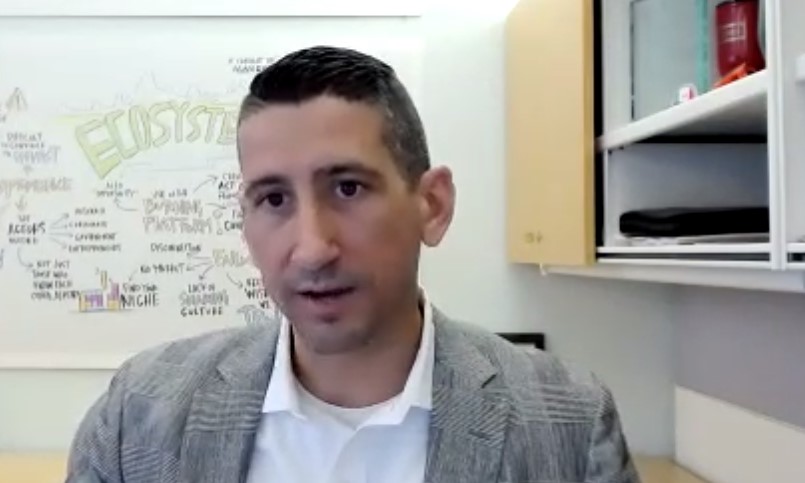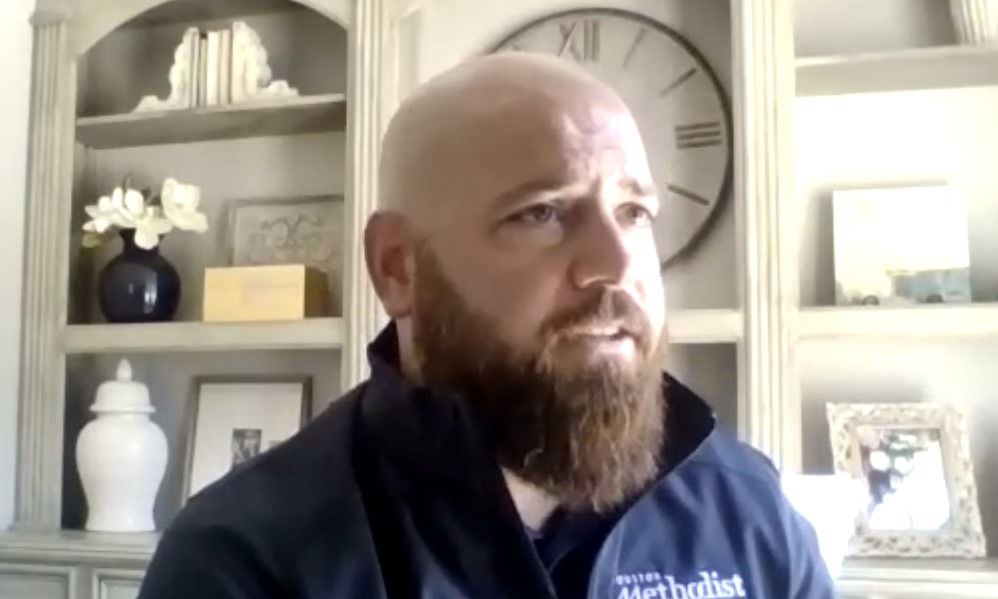Houston Health Care Innovation Takes Spotlight at Global Summit
Published Aug 12, 2021 by Maggie Martin
Leaders from Houston's innovation ecosystem recently told an international audience how the nation's fourth largest city is supporting new technologies, products and services within one of the most robust health care systems in the world.
Josh Sol, Administrative Director of Innovation and Ambulatory Clinical Systems at Houston Methodist, and Robert Pieroni, Economic Development Director at Central Houston, took part in a panel highlighting health care innovation on August 11. The discussion was part of HealthTech Beyond Borders, a virtual global conference created to help facilitate business opportunities for medical technology companies in the U.S. and Chile. The event also included speakers from innovation hubs in Chicago and Philadelphia.
Here are highlights of what Sol and Pieroni said during the discussion:
On why international health care startups prioritize the Houston market
“There is a tone and shift that we’re seeing in the Houston area that is focusing in on innovation,” said Sol, who noted Houston Methodist's hub alone has drawn interest from innovators all over the world. Methodist is one of 61 member institutions that make up the Texas Medical Center, the largest medical complex in the world.
Pieroni underscored TMC's world-renowned reputation in health care.
"When you really start looking at it from a scale perspective of patient testing and data, we really dwarf just about every other city around the world, and so it’s something we’re very proud of,” said Pieroni. “It is one of our unique assets that we’re actually building upon to be the Third Coast for Life Sciences.”
On how Houston supports health care startups
"2017 was our awakening to jumpstart the Houston innovation economy," said Pieroni, alluding to how Houston's unsuccessful bid for Amazon's second headquarters, HQ2, was a turning point for the city's innovation ecosystem. "Along that line, we started to create hubs for startups to land with coworking, accelerators, incubators, and really all those wraparound services."
Pieroni pointed to a few of those hubs, including Downtown Launchpad, a 17,000-square-foot innovation hub in the Amegy Bank Houston building on Main with resident partners including startup accelerators MassChallenge and gener8tor, as well as incubator Impact Hub Houston. He also talked about The Ion, the 266,000-square foot hub in the renovated Sears building at the heart of the Innovation District designed to bring entrepreneurs, corporate and academic communities together in a collaborative space. He also mentioned health care innovation specifically a focus at places like JLABS @ TMC, the startup accelerator and biotech incubator that serves as the largest JLABS footprint in the U.S. with over 34,000 square feet of common, wet lab and office space.
Sol acknowledged the health care industry can be challenging for startups to break into, but added founders can find a welcoming environment in Houston.
"Getting into a health care organization is definitely hard, especially to start doing pitches," he said. "I would say there is a flavor and a change that’s happening in the [Texas Medical Center] where it’s a little bit easier to get your companies in to pitch to an innovation team.”
Sol also touched on the impact COVID-19 has had on the health care industry.
“Health care is in a digital evolution," he said. "While the pandemic has been tremendously impactful, we’ve seen health care digital adoption increase by 10 years in the span of one because of the pandemic.”
On what early-stage companies need to consider and what steps they need to take to best prepare themselves to receive funding
Pieroni laid out what startups should consider as they pursue funding, including:
- Are you VC-backable? "Most startups – it is a term that is so vague now – but most startups think they’re venture-backable. They’re not," he said. "So, it’s really looking at your scale, your opportunity to scale. And then, of course, is it labor intensive? Some of the things you need to think about as you dive into that market.”
- Where are you in the life cycle of getting funding? "Many people think they’re ready for funding when they’re actually not," said Pieroni. "That is one thing that getting into an accelerator - and this kind of goes to the point of deal flow - when you get accepted into an accelerator, it’s an elite group of startups that you’re being accepted into.” He added MassChallenge and gener8tor as examples of these competitive programs, where only 8-11% of startups are accepted. However, applying for accelerator programs is worth the effort, as Pieroni noted that being accepted means the startup has been heavily vetted, which is attractive to potential investors.
- VC is no longer geographically-bound. "It doesn’t matter where you are in the United States. If you have a good product and a good company, you will be funded."
- Do your due diligence on the VC firms you want to target. "A lot of startups throw their decks at venture funds that have no interest in what they do," said Pieroni. He urged startups to research a VC firm's portfolio companies and ensure you wouldn't be a direct competitor, since you'll be sharing valuable information about your startup in your deck.
Pieroni and Sol both encouraged founders to get connected and involved with Houston's innovation ecosystem.
On VC investment growth in Houston
Houston has already raised $1 billion in venture capital in the first half of 2021. Life sciences and health care have become Houston's top-funded VC-funded industry, ahead of information technology and energy.
"So we have just seen a flood of venture capital money, and I think it’s because we have built these hubs that allow people to go to places to see large concentrations of startups," said Pieroni.
Learn more about Houston's health care and life sciences ecosystems. Read about innovation in Houston. Watch a Small Biz Insider interview with Robert Pieroni about Downtown Launchpad.
 The Houston Report
The Houston Report




















